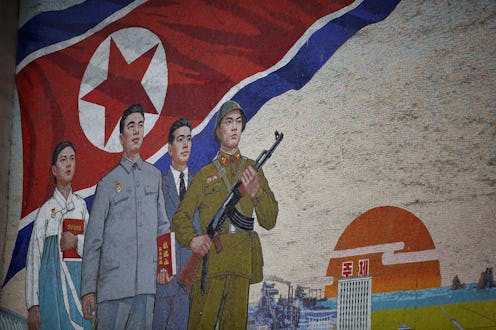News
How The Kim Dynasty Runs North Korea's Government Might Startle You

Since such a cloud of secrecy surrounds the country, you can't help but be curious about how North Korea's government actually works. Being one of few countries still under a communist regime, how its country is run is monumentally different from most countries you're probably familiar with.
On June 3, 2003, Kongdan Oh, a specialist at the Institute for Defense Analyses, broke down North Korea's political classification system for Brookings, a think-tank organization. She explained how the country is ruled by the Kim Dynasty: The current leader, Kim Jong Un, assumed leadership over the country after his father, Kim Jong-Il, died in 2011. Before Kim Jong-Il, there was Kim Il-Sung who began the dynasty and was the country's leader when it was first founded. According to the CIA, after World War II, Korea was split in half, with the north falling under Soviet-communist control while the south sided with the United States. After the Korean War, President Kim Il-Sung "adopted a policy of ostensible diplomatic and economic 'self reliance' as a check against outside influence."
Ultimately, the North Korean regime draws power from its people and their loyalty. According to Oh, it has reportedly forced its people to undergo a series of political examinations since the 1950s to sort the disloyal citizens from the loyal ones. After a three-year period of examinations starting in 1967, Kim il-Sung had sorted the people of North Korea into three distinct groups: the "core-class" who were loyal, the in-between "wavering class," and the "hostile class."
"An individual’s political loyalty is likely to be re-examined anytime he or she comes to the attention of the authorities, for example when being considered for a job, housing, or travel permit," Oh said. "One’s political classification is not a matter of public knowledge, nor is it known to the individual, but it is recorded in the personal record that follows every North Korean throughout life, and of course becomes part of the record of that person’s children and relatives as well."
Such practices, paired with extremely limited access to the outside world, has made it repressive. BBC News reports that radio and television services churn out propaganda in the form of positive reports about their leader, and that you could be forced into hard labor for listening to foreign media.
In an interview with the U.K.'s Telegraph, one woman in particular, Yeonmi Park, tells the story about how she and her mother managed to escape that repression. According to the Telegraph, she is only one of "tens of thousands" of North Korean escapees.
Her father was arrested for illegal trading in 2002 and sent to prison where he was tortured repeatedly by guards. After three years, he managed to bribe himself out of jail and her family began plotting how they could flee the country. "It was the first time I had seen a fancy rest room." Park said, reflecting on her first memory of South Korea after they had escaped. "I thought, 'It’s so clean. Do I wash my hands in the [lavatory bowl]?' Everything was shiny. I’d never seen anything like it."
Park has a dream of going back to China for her father's ashes and being able to bury them in a North Korea free from dictatorship.
"Kim Jong Un thinks he can keep going on being a king there," she said. "But nothing is for ever." While that's true, there's a small glimmer of hope that change could be on the horizon if North Korea begins to interact more with the outside world. The upcoming summit between Kim Jong Un and Trump will test that out.